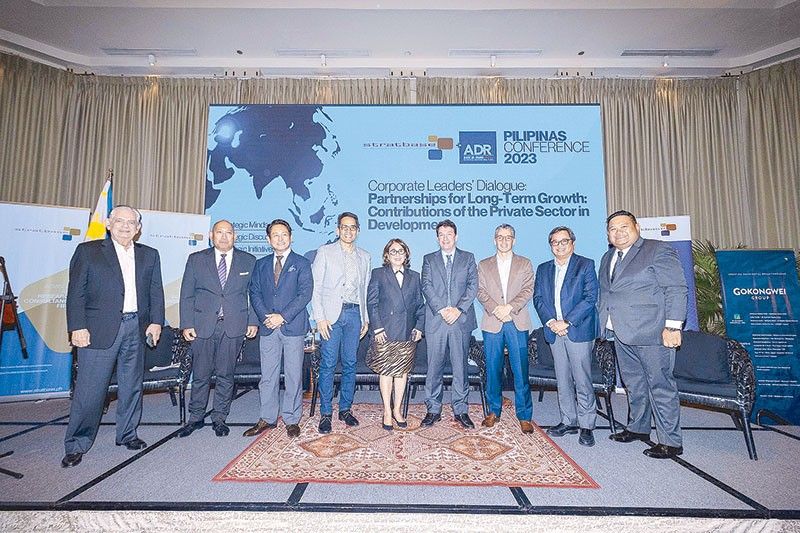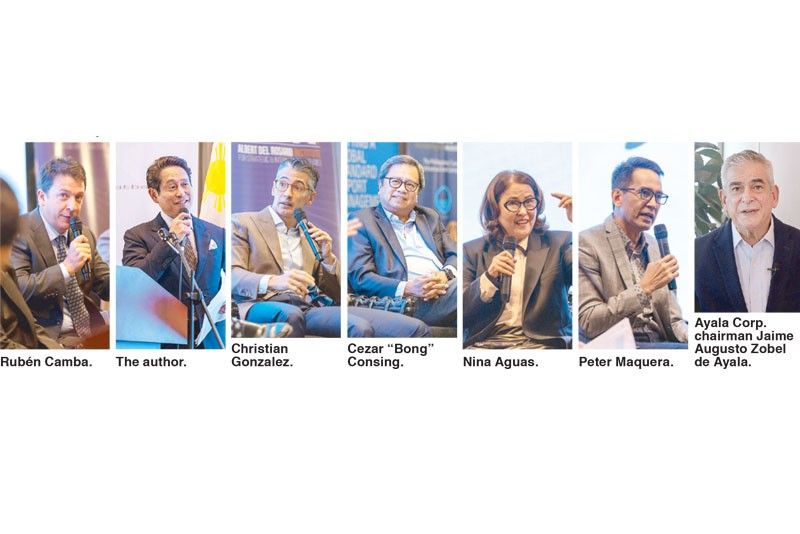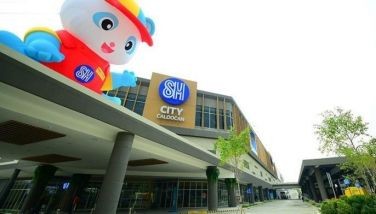The path towards economic security

The Stratbase Albert Del Rosario Institute, or Stratbase ADRI, recently held its eighth annual Pilipinas Conference at the Peninsula Manila, with the theme “The Path Towards Economic Security: Turning Global Risks into Opportunities.”
As in previous years, the conference gathered key leaders from the government, business sector, and the diplomatic community to share their insights on how the Philippines can contribute to achieving not just peace and stability but also inclusive economic growth in the Indo-Pacific.
According to Stratbase ADRI president Professor Victor Andres “Dindo” Manhit, they have “tracked the most pressing issues facing our country and gathered our government and industry leaders in engaging conversations on strategic solutions that would enable and accelerate a whole of society momentum to move forward.”
The conference kicked off with a panel discussion entitled “Economic Outlook and Strategies for 2024,” which brought together top economic managers to present their outlook on the Philippine economic landscape. In this session, Finance Secretary Ben Diokno said that, despite external risks and domestic challenges, the Philippines remains one of the brightest spots in the region. Diokno was confident that the economic outlook will improve further with the revenue-enhancing reforms being undertaken by the current administration.
Next up, Transportation Secretary Jimmy Bautista emphasized the pivotal role of addressing transport bottlenecks in enhancing the country’s economic trajectory and underscored the importance of public spending on infrastructure to drive economic expansion. Trade Secretary Fred Pascual, on the other hand, emphasized that, amid domestic and global economic headwinds, the Department of Trade and Industry was working to uphold the country’s growth trajectory through strategic programs and initiatives. Pascual also highlighted the pivotal role of foreign and local investments in driving the country’s economic ascent.
Budget Secretary Amenah Pangandaman delivered the keynote speech during lunch, noting that the administration’s efforts to implement key structural reforms to promote transparency, efficiency, and responsiveness in public service can foster a conducive business environment to ensure sustained economic growth.

The conference also had a keynote session entitled “Unlocking Philippine Natural Wealth: Sustainable Utilization of Resources for Economic Prosperity.”
In this session, Environment and Natural Resources Secretary Toni Yulo-Loyzaga announced the forthcoming release of a list of priority investment areas for minerals, forestry, and terrestrial coastal marine resources, aimed at promoting green and blue carbon. She also revealed plans to open one million hectares of classified government forest lands for investments in the first quarter of 2024. Yulo-Loyzaga stressed the need to engage the private sector for the optimal utilization of minerals and to leverage the country’s natural assets for economic growth.
DENR Undersecretary Dr. CP David highlighted the transformative potential of the Philippines’ abundant water resources as a key driver for economic development and progress in local communities. He announced that there are 135 water projects available for private sector investment, with a three-step process involving the quantification and mapping of water assets, resolution of conflicts among government water sector players, and private sector engagement.
The second panel discussion was on “Strategic Cooperation for a Secure and Robust Economic Architecture in the Philippines and in the Indo-Pacific.” In this panel discussion, Australian Ambassador HK Yu acknowledged the Philippines as Australia’s long-standing partner and highlighted the importance of sustainable economic growth. She was optimistic about the Philippine economy, stating that the country’s sound fiscal and monetary policies, good regulatory framework, and active private sector create an enabling investment environment.
For her part, Ambassador Beaufils emphasized that maintaining economic security is dependent on cooperation and partnerships, which translates to working together to protect the international rules-based economic order. She highlighted the success of the United Kingdom’s National Security Investment Act and their work in countering economic coercion.
The European Union’s Ambassador Luc Véron underscored the significance of simultaneously maximizing the benefits of economic partnerships and minimizing the risks from economic dependencies. The EU’s strategy is composed of three Ps: promoting competitiveness, protecting economic security, and partnering with reliable partners to address shared security concerns.
For Canadian Ambassador David Hartman, collective prosperity relies on a fair, predictable, and open international trading system. Building economic security relies on trade diversification, developing new commercial partnerships, investing in supply chain infrastructure, supporting a rules-based international trade system that is stable and inclusive, developing a robust national security review system, protecting critical infrastructure, and investing in cyber security, protecting intellectual property, technologies, and data.
United States Deputy Chief of Mission Y. Robert Ewing, who represented Ambassador MaryKay Carlson, emphasized that economic and political stability are critical for the Indo-Pacific region to flourish. The region must be equipped to mitigate and respond to shocks ranging from territorial disputes, climate change, and energy to ensure a positive trajectory of economic growth. He reaffirmed the commitment of the United States to principles, norms, and standards of the international community to ensure a stable and prosperous region.
The last session was a Corporate Leaders Dialogue, which I had the honor to moderate, with the theme “Partnerships for Long-Term Growth: Contributions of the Private Sector in Development.” We had Ayala Corp. chairman Jaime Augusto Zobel de Ayala, Ayala Corp. president and CEO Cezar Consing, International Container Terminal Services, Inc. executive vice president Christian Gonzalez, Microsoft Philippines CEO Peter Maquera, Acciona S.A. Director of Infrastructure in Southeast Asia Rubén Camba, and Insular Life executive chairperson Nina Aguas.
All were one in saying that they were willing to continuously collaborate with the government on projects under a Public-Private Partnership (PPP), embrace new technologies, and invest in the workforce to stimulate the economy.
As Manhit also said, it is important to know how we can take the path toward economic security — a condition where individuals enjoy a stable source of income and are consistently able to meet their basic needs — by turning global risks into opportunities. Indeed, national security is no longer confined to matters of defense capabilities; economic security is a crucial component of this. It is only when people are economically secure that the nation can also be secure.
I trust that this is highly achievable under the PBBM administration.
- Latest
























